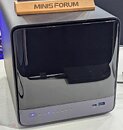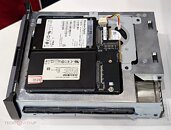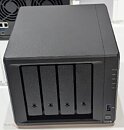
Colorful Debuts iGame Duo SSD: GPU with Two M.2 Drives
At Bilibili World 2025, Colorful quietly introduced a unique all-white version of its iGame Ultra Duo SSD graphics card that combines high-end GPU performance with built-in storage. The card features a two‑fan cooler coated in matte white, which immediately sets it apart from the usual dark designs you see on the market. Although Colorful has not confirmed whether it is based on NVIDIA's new GB206 or GB207 architecture, either RTX 5050 or 5060, the real point of this product is the dual M.2 SSD slots on the back of the compact PCB. Users can simply slide in drives without any extra cables, and the heatsink mounting points are cleverly positioned between the storage bays and the rear I/O bracket.
Thanks to PCIe bifurcation, the card splits a standard x16 slot into eight lanes for the GPU and four lanes for each SSD, so neither graphics nor storage performance is compromised. Given that the PCIe bandwidth is more than enough for this GPU SKU, even an x8 lane is enough for performance to stay intact. By placing SSDs near active cooling, Colorful ensures they stay cool even under heavy workloads. Official specs and pricing are not yet available, but this hybrid design is sure to catch the eye of gamers and content creators looking for a sleek, high-capacity storage build.
Thanks to PCIe bifurcation, the card splits a standard x16 slot into eight lanes for the GPU and four lanes for each SSD, so neither graphics nor storage performance is compromised. Given that the PCIe bandwidth is more than enough for this GPU SKU, even an x8 lane is enough for performance to stay intact. By placing SSDs near active cooling, Colorful ensures they stay cool even under heavy workloads. Official specs and pricing are not yet available, but this hybrid design is sure to catch the eye of gamers and content creators looking for a sleek, high-capacity storage build.















































































